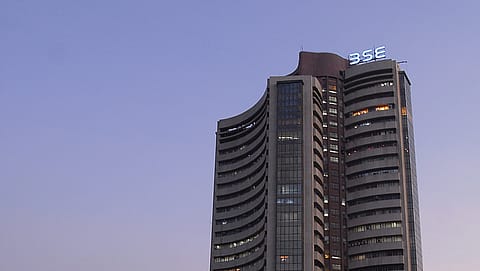Sensex, Nifty wobble on U.S. debt worries, Middle East tensions; here’s why investors should turn to domestic cues amid global uncertainty
Sensex and Nifty tumble amid rising U.S. debt concerns and Middle East tensions. Discover why experts urge investors to shift focus to domestic cues, resilient sectors, and buy-on-dip strategies in today’s volatile Indian stock market.

Indian equities have been on a tailspin today, with the previous session’s gains wiped out, as concerns mount over U.S. fiscal policy along with rising geopolitical tensions in the Middle East.
The benchmark BSE Sensex fell 645.09 points, or 0.79%, to close at 80,951.99, while the NSE Nifty 50 dropped 204 points, or 0.82%, to settle at 24,609.70.
The selloff became acute during the day, with both indices sliding over 1.4% at their intraday lows. The Sensex touched 80,489.92, while the Nifty briefly slipped below the 24,500 mark to touch 24,462.40.
Thursday’s drop erased nearly ₹2 lakh crore in investor wealth, as the total market capitalisation of BSE-listed companies fell to around ₹439 lakh crore from ₹441 lakh crore in the previous session.
However, the sell-off notwithstanding, broader markets proved to be more resilient. The BSE Midcap index fell a modest 0.33%, while the BSE Smallcap index, on the other hand, bucked the trend and closed 0.17% higher.
Market analysts have noted that the weakness is seen across the breadth of global equities, as anxiety grows over ballooning U.S. debt. As reported by CNN, a tax and spending bill, expected to be voted on in Congress this week, is projected to add as much as $3.8 trillion to the existing $36 trillion US debt pile. Investors are increasingly wary that the added fiscal strain could further slow growth in the world’s largest economy.
But the growing geopolitical tensions in the Middle East could have added another layer of concern. As per news reports, the U.S. has obtained intelligence suggesting Israel may be preparing for a military strike on Iranian nuclear facilities. Though Oman’s foreign minister said that new nuclear talks between Tehran and Washington are scheduled for later this week, the potential for escalation has put risk assets under pressure.
Recommended Stories
According to Kranthi Bathini, Director, Equity strategy, WealthMills Securities, while the easing geopolitical tensions between India and Pakistan did give the equity markets some room to breathe, the recent global cues are largely the reason pushing the markets to correct.
“The Indian markets had a solid run over the last month or so, largely supported by foreign portfolio investor (FPI) inflows and easing geopolitical concerns. The indices surged quickly, with the Nifty even touching 25,500. But markets were looking for a reason to consolidate, and that came in the form of global cues—particularly concerns around the rising US debt pile. That, coupled with some profit booking and a wait-and-watch approach by investors, led to the recent correction,” he said.
As per Bathini, there is some unease on the domestic front as well, which has contributed to the growing uncertainty in the equity markets overall.
“There’s also a bit of uncertainty on the domestic front. While not alarming yet, there have been early reports indicating a slight uptick in COVID-19 cases. So, there’s a combination of global nervousness and local caution at play.
(INR CR)
Some analysts have also suggested that tepid results from companies during the March quarter could have also contributed to the present downturn. Bathini adds that the present uncertainty is likely to remain for a while, although the Indian markets do have a few reasons to cheer as well.
“Yes markets will remain choppy in the near term. But India is likely to trade with a positive bias,” he said.
According to him, the earnings season from the Q4 cycle has been decent, and there have been no major negative surprises, and most company managements remain optimistic about the coming quarters.
“India’s domestic macro environment is solid, monsoons are tracking well, and there's a growing consensus that we are entering a rate-cut cycle. All these factors support a medium- to short-term strategy of buying on dips and selling on rallies,” he said.
But the global cues notwithstanding, India does have certain attractive sectors that can still give good return to the diligent investor.
“At this point, investors should focus on domestically driven sectors. Infrastructure and defence are particularly strong themes right now. Defence stocks have already seen significant gains, but any dip there presents a good buying opportunity. Healthcare is another interesting space that investors should consider in the current environment,” Bathini added.